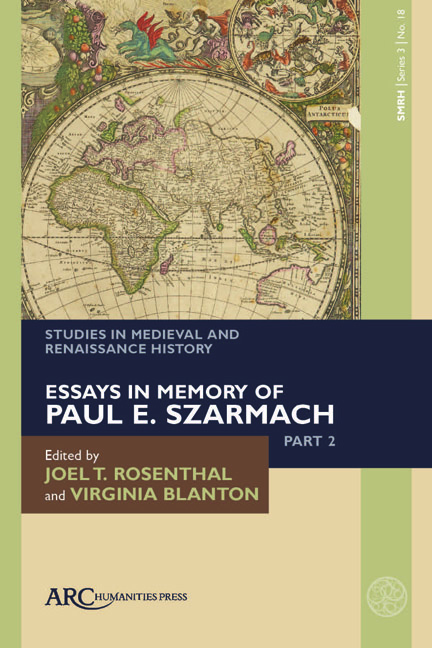Book contents
- Frontmatter
- Contents
- List of Illustrations
- Introduction
- The Development of Constantinian Themes and Their Manifestation in Writings and Coinages of Early England
- Echo and Icon : Life in Stone at Bewcastle, Cumbria
- Jerome of Strido at Chelles: The Legacy of Quedlinburg Codex 74
- Revisiting the Maaseik Zoomorphic Embroideries
- The Old English Version of Alexander’s Letter to Aristoteles and its Use of Binomials
- Agency and Obedience : The Afterlife of St. Swithun in Anglo-Saxon England
- B. and the Vita Harlindis et Renulae
- Wheelock’s Bede and Its Supplementary Materials : Goals and Methods
Agency and Obedience : The Afterlife of St. Swithun in Anglo-Saxon England
Published online by Cambridge University Press: 13 April 2024
- Frontmatter
- Contents
- List of Illustrations
- Introduction
- The Development of Constantinian Themes and Their Manifestation in Writings and Coinages of Early England
- Echo and Icon : Life in Stone at Bewcastle, Cumbria
- Jerome of Strido at Chelles: The Legacy of Quedlinburg Codex 74
- Revisiting the Maaseik Zoomorphic Embroideries
- The Old English Version of Alexander’s Letter to Aristoteles and its Use of Binomials
- Agency and Obedience : The Afterlife of St. Swithun in Anglo-Saxon England
- B. and the Vita Harlindis et Renulae
- Wheelock’s Bede and Its Supplementary Materials : Goals and Methods
Summary
THE EARLIEST RECORD of the miracles of St. Swithun, composed by the continental monk, Lantfred, provides a lengthy and stylistically baroque account of the many miracles of the ninth-century Anglo-Saxon bishop of Winchester. Lantfred wrote the Translatio et miracula S. Swithuni within just a few years of the translation of the saint's relics in 971 ce, though it seems likely that he did not himself witness the event The Latin work adopts the conventions of the translationes of previous saints which were clearly well-known to Lantfred, though his debt to these writings is by no means slavish. Though apparently not present for the translation itself, Lantfred likely was on hand in person for many of the miracles (or their aftermath) that he records, thus leading to the rich detail he provides of the persons involved and the contexts of many of the miracles. Ælfric's Old English translation, based upon Lantfred's Translatio et miracula and an Epitome of Lantfred's work (possibly extracted and written by Ælfric himself) provides another unique insight into the impact that a newly recognized saint could have upon the community in which the saint's cult was being established. Ælfric witnessed many of the recorded events himself, including the translation, and though Ælfric's record is sometimes at odds with Lantfred's accounts, it “leaves us much in the dark with regard to its author's innermost thoughts on the events recorded there,” as Mechthild Gretsch points out. Such hagiographical variety, written so closely to the events, pulses with the life and energy of eye-witness accounts from both inside and outside the monastery at Old Minster. Elaine Treharne observes that “A hagiographer could and did move between writing the lives of saints and writing the chronicle of his or her religious institution, arguably seeing little difference between the modes of composition.” Both Lantfred's and Ælfric's works demonstrate how inextricable hagiography and institutional chronicle could be. Ælfric's Old English translation of Lantfred's Latin translatio makes available to his tenth-century vernacular audience (and to Old English scholars today) not only the story of Swithun's discovery, but also unique details of how the afterlife of the new saint shaped and impinged upon the lives of the monks at the Old Minster in Winchester—at times to an uncomfortable degree.
- Type
- Chapter
- Information
- Studies in Medieval and Renaissance HistoryEssays in Memory of Paul E. Szarmach, Part 2, pp. 131 - 138Publisher: Amsterdam University PressPrint publication year: 2024

